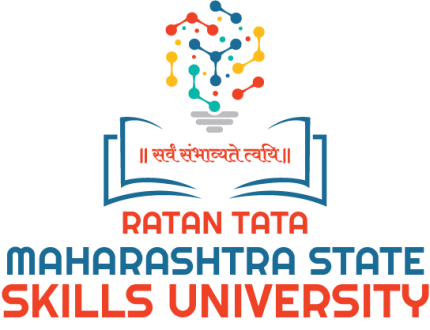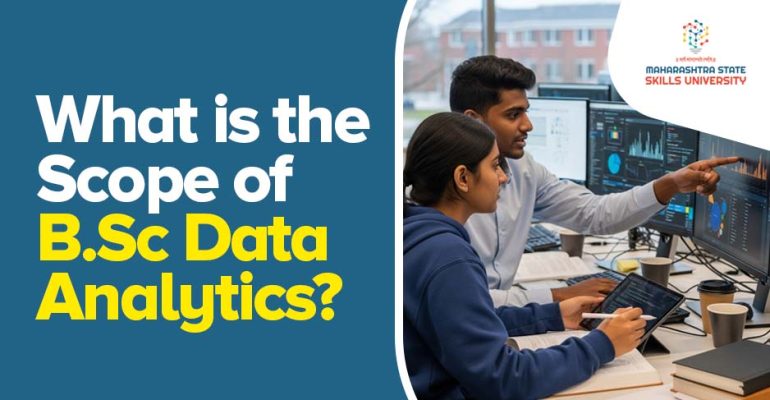Career Scope of B.Sc. in Data Analytics
August 18, 2025 2025-08-25 16:19Career Scope of B.Sc. in Data Analytics
Every action we take leaves a trace in the digital world. Everything from a simple search to a payment, from smart city sensors to social media numbers, creates a huge amount of data. The International Data Corporation estimates that the world will generate 175 zettabytes of data by 2025. Businesses need people who can collect this data, understand it, locate trends, and aid leaders in acting on it. That’s why Data Analytics is so important.
For Indian students who want future-proof careers, a B.Sc. in Data Analytics is a great way to enter this field. One of the first schools to offer this type of program is the Ratan Tata Maharashtra State Skills University (RT-MSSU), a skills-focused university created by the Maharashtra government. Their B.Sc. in Analytics program aims to produce graduates who are not only educated but also have the skills to meet the needs of India’s quickly growing digital economy.
Data Analytics on the Rise in India
India is becoming a major global data center. With over 700 million internet users and the Digital India plan, using data to make choices has spread to banking, healthcare, manufacturing, e-commerce, and even farming. NASSCOM says that the Indian analytics field is growing by 25% each year and should be worth over ₹1 lakh crore by 2027.
This growth comes not just from the IT field but also from old industries changing with analytics. Banks use it to find fraud, stores to make supply chains better, hospitals to give custom treatments, and government groups to check public policy results. Because of this, the need for trained analytics people is higher than what is available. A Data Analytics degree gives grads a head start in this growing job market.
B.Sc. Admission Open at MSSU Apply Now
Career Opportunities After B.Sc. in Data Analytics
Program graduates can find jobs in many fields. Here are some potential roles:
- Data Analyst: Cleans data, does statistical studies, and creates reports to help groups make better choices.
- Business Analyst: Uses data to match business tasks with goals, which aids in making things more efficient, productive, and in growth.
- Marketing Analyst: Works for online stores and digital marketing firms to understand what customers do, tracks how well marketing works, and suggests ways to boost activity and sales.
- Clinical Data Analyst: Works in hospitals to handle patient info, studies treatment results, and aids in boosting patient care using data
- Junior Data Engineer: Helps create and manage data systems, handles big data sets, and makes sure data setup is ready for analysis.
- Visualization Expert: Presents data clearly with visuals with tools such as Tableau or Power BI, enabling leaders to understand findings quickly.
- Machine Learning Associate: Works on making predictions and automations with guidance from senior data scientists, helping with modern analytics and AI programs.
These careers are appealing because they’re not just in IT. Many parts of the Indian economy such as farming, retail, banking, and government are investing in analytics. For instance, farming tech firms use analytics to predict crop amounts, and finance tech startups use it to judge customer risk. This lets graduates pick jobs that fit what they like and the rising needs of India.
Salary Prospects in India
For students eyeing this field, the attractive salary is a big draw. In India, Data Analysts can expect to start between ₹4.5 to ₹6.5 lakhs a year, based on Glassdoor and PayScale data. After two or three years, this can jump to ₹8–10 lakhs annually.
Business Analysts usually make a bit more, with starting salaries around ₹5–7 lakhs per year, varying by industry. If you have skills like machine learning or big data, you might start at ₹8 lakhs per year. As you gain experience, mid-level salaries can go from ₹12 to ₹18 lakhs. Senior data scientists and analytics managers in India’s top companies can earn over ₹25 lakhs each year.
Here’s a quick look at expected salary ranges for some important roles after a B.Sc. in Analytics:
|
Job Role |
Entry-Level Salary (INR per annum) |
Mid-Career (5–7 years) |
Senior-Level (10+ years) |
|
Data Analyst |
₹4.5 – ₹6.5 lakhs |
₹8 – ₹12 lakhs |
₹18+ lakhs |
|
Business Analyst |
₹5 – ₹7 lakhs |
₹10 – ₹15 lakhs |
₹20+ lakhs |
|
Data Engineer |
₹6 – ₹8 lakhs |
₹12 – ₹18 lakhs |
₹22+ lakhs |
|
Machine Learning Associate |
₹7 – ₹8 lakhs |
₹15 – ₹20 lakhs |
₹25+ lakhs |
|
Visualization Specialist |
₹4 – ₹6 lakhs |
₹9 – ₹12 lakhs |
₹18+ lakhs |
The data indicates that analytics offers a stable career with good chances for growth.
Speak to RT-MSSU BBA Career Counsellor at: 86559 46646/47
Future Pathways Beyond Jobs
Beyond just getting a job, a B.Sc. in Analytics can also help you get more education. Graduates can get master’s degrees in Data Science, AI, Business Analytics, or an MBA specializing in Analytics. People interested in teaching or research can pursue M.Phil. or Ph.D. programs.
Another option is starting your own business. India has a growing startup scene, so graduates can start their own businesses that use analytics in areas like finance, education, healthcare, or agriculture. With support from incubators and government programs, students trained in analytics can come up with new solutions to problems.
How Industries are Changing & What Companies Want
Businesses today don’t just see data analysis as something extra; it’s a key part of how they plan. A McKinsey study says that companies that use data analysis are much better at getting customers and making money.
In India, industries such as banking, insurance, online retail, telecom, and pharmaceuticals are doing a lot of hiring in this area. For instance, banks now use data analysis to spot fraud as it happens, and telecom companies predict when customers will leave by using machine learning. Even the government is using data analysis more to run smart city projects, forecast traffic, and create public programs.
For RT-MSSU graduates, this means the abilities they learn are very important for the jobs they’ll get. The program focuses on useful tools, so they will have what employers are looking for.
RT-MSSU’s Program: What Makes It Special
Many schools offer computer science or IT degrees, but RT-MSSU’s B.Sc. in Analytics is different because it puts skills first. This course uses a 60:40 model, unlike regular programs that focus a lot on theory. Here, 60% of what you learn is about useful, job-related skills, and 40% is about academic ideas. Students learn programming languages such as Python and R, and also how to use visualization tools like Tableau and Power BI, the basics of machine learning, and how to handle big data.
What makes this program useful is the On-the-Job Training (OJT) in the final year. Students get real experience working for a company before they graduate. This means that students are ready to work.
The course is also adaptable. Students can get a diploma after two years, a vocational degree after three, or finish the four-year bachelor’s degree. This works for plans and money situations, making sure that no study year is wasted.
RT-MSSU’s Placement System
A key benefit of studying at RT-MSSU is our strong placement system. The university partners with top companies in IT, consulting, finance, and manufacturing. Our placement office arranges practice interviews, soft skills training, resume workshops, and networking events with companies. This approach helps students graduate with both skills and confidence for the job market.
The required On-the-Job Training in the final year works as a full-year internship. This gives students a chance to turn their training into full-time job offers. With increasing partnerships in Maharashtra and other regions, RT-MSSU is becoming known as a skills-focused university that links education with the professional world.
Final Thoughts
In conclusion, a B.Sc. in Data Analytics offers wide-ranging, secure, and well-paid career options. Indian students can view it as more than just a degree; it’s an entry into a rapidly expanding industry around the world. Institutions like RT-MSSU enhance this potential by combining skill development, industry exposure, and rigorous academics.
Given that companies urgently need experts who can turn data into practical insights, RT-MSSU graduates are well-prepared. The flexible curriculum, hands-on training, and strong placement assistance mean students don’t just hope for good jobs—they actively create them.
For students considering their options, this program represents a smart career move. It fits well with the demands of India’s business sector and the possibilities of an increasingly digital world.
Frequently Asked Questions
What career options are available after a B.Sc. in Data Analytics in India?
Answer:A B.Sc. in Data Analytics can lead to jobs in IT, banking, healthcare, e-commerce, finance, agriculture, and government. Graduates may find positions as Data Analysts, Business Analysts, Marketing Analysts, Clinical Data Analysts, Data Engineers, or Machine Learning Associates. There’s good room to advance in many job fields.
What’s the average starting salary after a B.Sc. in Data Analytics?
Answer:In India, people with a data analytics degree typically start around ₹4.5–7 lakhs per year. With three to five years on the job, they can earn ₹10–15 lakhs. Experienced Data Scientists or Analytics Managers can make over ₹20 lakhs per year.
Why should I pick RT-MSSU for a B.Sc. in Analytics?
Answer:Ratan Tata Maharashtra State Skills University (RT-MSSU) has a special program that mixes skills with schoolwork, with a year of training at a real business, classes that match what companies need, and good help finding jobs. This makes sure graduates are prepared and ready to work.
Is a B.Sc. in Data Analytics a better choice than a regular Computer Science degree?
Answer:Computer Science is wider in scope, but Data Analytics programs are more targeted and focus on what companies want. A B.Sc. in Analytics stresses practical tools, predicting trends, and using data to make choices. It’s a good choice because there’s a growing need for analytics experts in India.
Can I get a further degree after a B.Sc. in Data Analytics?
Answer:Yes. Graduates can continue their education with an M.Sc. or M.Tech in Data Science, Artificial Intelligence, or Business Analytics, or get an MBA in Analytics. Some also go into research or start their own businesses.
Related Posts
Search
Categories
Popular Tags
Popular tags
Popular tags



